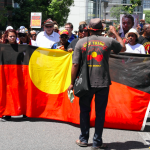Indigenous Incarceration: Australia’s Shame

Indigenous Australians are reported to be the most imprisoned race in the world, and the situation is only getting worse.
The proportion of Indigenous inmates in NSW prisons has risen by 35% since the Coalition government came to power in 2011. The NSW Minister of Corrections, David Elliott, has called it “a tragedy” that Aboriginal and Torres Strait Islanders now represent 24% of the state’s prison population.
Around 3% of Australia’s population currently identifies as Indigenous, which means Indigenous people are being imprisoned at 11.3 times the rate of non-Indigenous people.
The situation stems from a range of socioeconomic factors – including poverty, lack of employment opportunities and housing, and mental health and drug and alcohol issues – as well as the targeting of alleged Indigenous offenders who are often placed into custody over matters which may be overlooked for others, and the lack of tailored preventative and diversionary programs.
Lack of Diversionary Programs
The Australian Bar Association and Aboriginal Legal Service have criticised the lack of government investment in programs for rural communities.
“We have postcode justice,” said Sarah Hopkins, Managing Solicitor of justice projects at the Aboriginal Legal Service. “Diversionary options are not available across all of NSW, particularly in regional and remote areas, so courts are unable to divert people from prison.”
Incarceration for Minor Offences
Ms Hopkins has criticised the arrest and incarceration of Indigenous people for minor offences; including for the so-called ‘trifecta of charges’, where Aboriginals and Torres Strait Islanders are aggressively confronted by police over the use of offences language, and the encounter escalates to resisting arrest and assaulting police.
The head of the Bureau of Crime Statistics and Research (BOCSAR), Don Weatherburn, recently spoke out against the imprisonment of Indigenous people for driving offences which are not inherently dangerous.
In a presentation to the NSW Law Society, Dr Weatherburn identified the biggest driver of growth in Indigenous convictions between 2011 and 2016 as regulatory driving offences such as unlicensed driving, followed by breaches of community-based orders imposed for the initial offence.
BOCSAR’s research suggests that over 95% of Indigenous inmates are serving sentences of less than two years. Dr Weatherburn sees imprisonment for minor offences as counterproductive, as it draws people into a cycle of crime by stigmatising them, placing stress of family and social connections, and reducing future employment prospects.
Bail Laws
Former head of the NSW Bar Association, Phillip Boulten SC, has called the state’s current bail regime “inappropriate” and a “major contributor” to the Indigenous incarceration rate.
“In many cases, people in disadvantaged circumstances have no stable address to be bailed to and as a result are locked up.” Mr Boulten remarked. “We need to consider more practical measures, such as bailing Indigenous offenders to a community of elders and giving these communities a role in the justice process.”
NSW Corrections Minister David Elliot agrees, stating “All incarceration has gone up because we toughened the Bail Act.”.
A Sensible Approach
There is an enormous amount of research to suggest that investing in programs which seek to address the underlying causes of crime, and divert alleged offenders away from the criminal justice system are not only more successful in reducing reoffending rates than imprisonment, they are better value for money.
A recent study by Deloitte Access Economics found that $111,000 can be saved per person annually by diverting non-violent Indigenous offenders with drug problems into treatment, instead of sending them to prison.
The reoffending rate for all offenders in NSW is extremely high – with 48% of inmates returning to prison within two years of their release. The state government’s primary response is to invest in building 7000 new prison beds within the next four years, at a cost of $3.8 billion to the taxpayer. Many believe the money could be far better spent on criminal justice reform, including a greater emphasis on prevention and diversion.
Shadow Attorney-General, Paul Lynch, believes the government should be spending more on initiatives like justice reinvestment, where money is invested into projects which address the underlying causes of crime.
“Aboriginal incarceration rates are alarmingly high. The situation is now worse than it was at the time of the Royal Commission into Black Deaths in Custody,” Mr Lynch said, promising his party would place a greater emphasis on prevention and diversion if elected.







